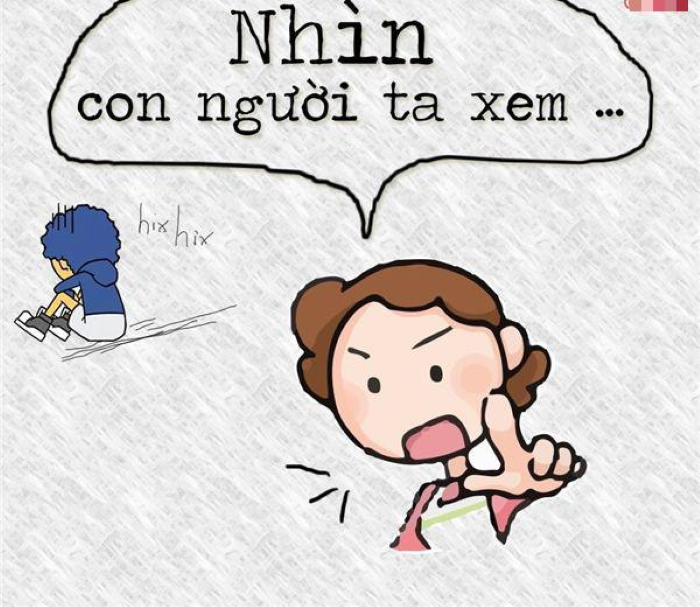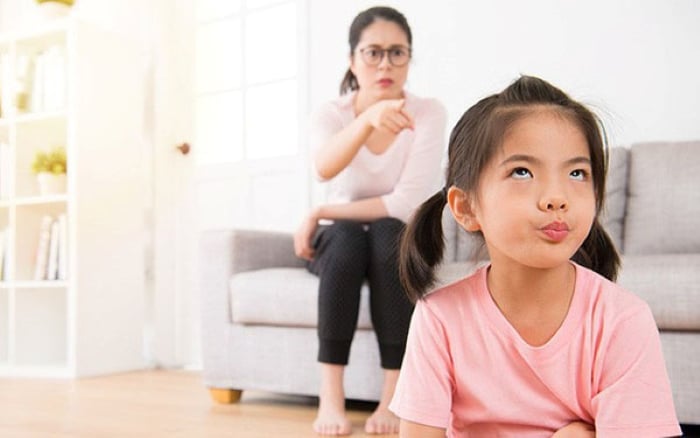1. Teaching children like pets
We make fish climb trees and monkeys swim underwater.
Children of other people learn or excel at something, then we want our children to do the same, even forcing them to do it.

2. Comparing children to others
In reality, many parents like to compare their children to others, using phrases like: “Why did you get such a low score, your friend A gets perfect 10s” or “Your friend B is so well-behaved, why are you misbehaving…”.

This will create a distance between parents and children. No child wants to be compared to another child, especially if they fall short.
Each child has their own abilities, strengths, and weaknesses. Instead of comparing, let’s recognize the good qualities and help our children develop them.
3. Raising children based on public opinion
“Why is your child so skinny, mom doesn’t let them study more so they’re not smart…”, “Give your child this formula milk, it’s better than that one”… There are many public opinions surrounding the way Vietnamese parents raise their children. Unfortunately, many parents are influenced and follow the teachings of others.
4. Threatening and intimidating children
“If you don’t stop crying, I’ll take you to the doctor/police officer”, – this threatening statement is not uncommon in Vietnamese families, but psychologists advise parents not to use this method.

In reality, when afraid, children can’t think through their actions. Instead, they will be anxious every time they see a police officer, doctor, or the people their parents use to intimidate them. In addition, because the brain is accustomed to quickly process frightening information, children will feel even more fearful.
5. Evaluating children’s development based on…weight
The slogan “Raise healthy children, teach obedience” is actually about raising children to be overweight. This is a misguided idea. Vietnamese mothers still implicitly compare their children to others, proud that their child is chubbier.
Weight does not indicate a child’s health. Children need not only nutrition but also muscle movement and physical activity.
6. Keeping children indoors when it’s raining or cold
Schools and parents have an almost reflexive reaction of not allowing students to go outside when the weather is unfavorable and canceling field trips for children.
In contrast, the Japanese view this as an opportunity to toughen their children and develop their adaptability. They even send their children to school when they’re sick to help them forget about being sick and quickly recover. Of course, severe illness or contagious diseases are exceptions.
7. Improper rewards
Vietnamese parents often share with each other that if their child achieves something, they should reward them, take them out to play… This is illogical, as parents are rewarding themselves, not the child. For children who are already protected and don’t even need to ask for things, this can be very detrimental.
Simply put, if children are provided with food, clothing, shelter, education, and leisure activities by their parents, they should be responsible for doing those things well because those things will build a bright future for themselves.
8. Good grades as the only “mission”
The Vietnamese view still evaluates academic achievements through grades. Being good at school is almost the sole criterion for evaluating children. Vietnamese children bury themselves in studying, without the need for physical exercise, sports, or learning skills… Even household chores are not required because parents prioritize their children’s academic performance.
This is a very misguided view that needs to change. A successful person balances multiple factors: Knowledge – Skills – Health – Social relationships… To achieve these things, children need to have a balance of learning and playing, be allowed to explore and experience from elementary school.
9. Public criticism
It violates personal privacy and insults a person’s dignity.
Parents, teachers, and schools judge a child and teach them to judge others.
This is a very inhumane action.
10. Blindly serving children
On Tet Day 30, a television program told the story of an old father from Nam Dinh who went to Hanoi to work hard and forgot about Tet just to earn money to support his child who was going to college.
Who is supporting whom? The child himself works to support himself, not to mention supporting the father.
Parents not wanting their children to grow up is a chronic problem in our society.
Many parents see serving or doing things for their children blindly in this way as joy, responsibility, or simply caring or compensating for something. It’s beyond imagination how wrong this is.
Our children will either be potted plants or glass cups that can fall and shatter at any moment.
Learning Tips for Parents: 12 Japanese Techniques to Use with Your Children
Discover the 12 principles of teaching children in the traditional Japanese way that parents can learn with Dien May XANH! By instilling these principles when your children are young, you can ensure that they grow up to be obedient, smart and polite, the hallmarks of a successful education in Japan.
Mothers’ Need for Awareness of Dual Activity of Breastfeeding and Watching TV
In the contemporary world, in which technology pervades our lives, some mothers tend to soothe their babies through nursing while simultaneously watching television. Although this practice may not appear to affect the infant, studies show that it can in fact have dire repercussions on the baby’s well-being, both in terms of physical health and mental growth. In this article, we will look at the possible reasons for this activity and its potential outcomes.




































